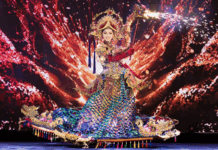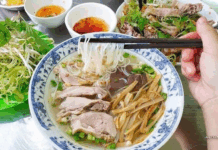Farewell to Kitchen God
| Land Genie and the Kitchen God ride carps to Heaven to deliver an annual report on the household’s activities to the Jade Emperor. Photo: Tet feast to farewell Kitchen God was prepared by Ngo Phuong Lan. Kitchen God |
The first ritual which kicks off the Tet celebration in the country is the “Ong Cong – Ong Tao” (Land Genie and Kitchen God) or the “Kitchen God” farewell. It starts on the 23rd day of the last month of the lunar year.
Legend has it that Land Genie and the Kitchen God are sent down to earth by the God of Heaven for monitoring and recording all the good or bad manners of the human during the year.
Then, on the 23rd day of the twelve months in the Lunar Calendar, they ride carps to Heaven to deliver an annual report on the household’s activities to the Jade Emperor. According to this report, the Jade Emperor will decide to bless or punish that family in the next year. Also, he will forward the household prayer for a prosperous and peaceful Lunar Year to the Supreme.
Therefore, preparing a hearty worshiping tray filled with abundant of votive offers and carps or golden fish to release, somehow, is the way that Vietnamese families show their thankfulness to the deities.
At the same time, they also wish that the Land Genie and the Kitchen God will tell the good things about them to the Jade Emperor, as well as asking, on their behalf, for a peaceful and prosperous coming New Year.
Ring out the old, ring in the new
| The boiled chicken for New Year’s Eve worshipping ritual is prepared by culinary expert Nguyen Phuong Hai. |
The ritual on the New Year’s Eve is the most important one of Vietnamese people during the year. It usually takes place at 0:00 of the first day of the new year to “tong cuu, nghinh tan” (ring out the old, ring in the new) and pay tribute to the ancestors. It is also known as the ritual of driving away evil spirits or bad luck of the old year and welcoming good luck.
The ritual takes place outdoor, indoor and in the kitchen. The outdoor ritual is to bid farewell to the Genie who takes care of the world and the people in the old year and to welcome the new one. It comes with an offering tray of food, fruit, candles, fresh flowers, wine, tea, rice, salt and votive paper.
The same offering is prepared for the indoor one in order to pay gratefulness to Tho Cong (the tutelary Genie of the house) and the ancestors. Meanwhile, the one held in the kitchen is aimed at begging the Kitchen God for a year full of food with an offering of fruits.
Welcome the first new day with ancestors and deities
| The Tet feast for the first day of the lunar New Year is prapared by Huong Dao. |
The ritual of Nguyen Dan (the first day of the new year) is held on the first day of the first month in the lunar calendar to revere the ancestors and deities.
Accordingly, the altar is cleaned and an offering tray of traditional food, fruits and votive paper is put there, aimed to “invite” the ancestors and deities to enjoy the best dishes for the occasion.
Then every member in the family will come to the altar to commemorate and show respect to their ancestors and deities as well as pray for the best wishes for the new year.
Depending on the family, the same ritual can be repeated a few more times during the first three days and relatives and friends are invited to enjoy the food together afterwards.
Particularly, it is believed that the ancestors and deities always present on the altar the three first days of the new year so light and incense must be kept on during these days.
| A Hanoian’s ancient cake for Tet- the Banh Gac (Gac cake) is prapared by culinary expert Nguyen Phuong Hai. |
Farewell to ancestors and deities
It is also believed that the ancestors and deities have a limited time to visit their descendants on the occasion of the New Year so a farewell ritual is also held, traditionally from the third day to the tenth day of the first month in the lunar calendar.
It aims to show them again the respect and expectation for their blessings for the New Year.
| This fourth feast for Tet with delicious attractive Vietnamese dishes is cooked by Chef and Culinary expert Nguyen Phuong Hai |
Together with a popular offering of food, fruit, and wine, burning votive paper is an indispensable part of this ritual. Votive paper is regarded as money to give to the ancestors and deities.
Today, votive paper is more diversified with paper figurine of houses, cars, motorbikes, mobile phones, clothes, among others to prepare a better life for the beloved people in the other world.
This is also an opportunity for the families and friends to gather as the last party before coming back to work and looking forward to reuniting again in the next new year.








